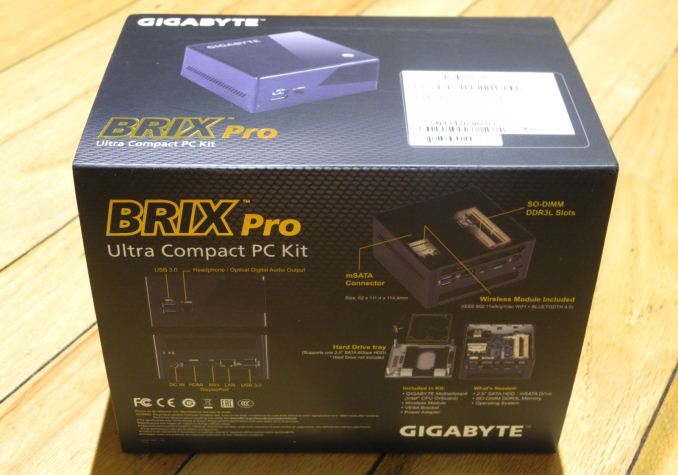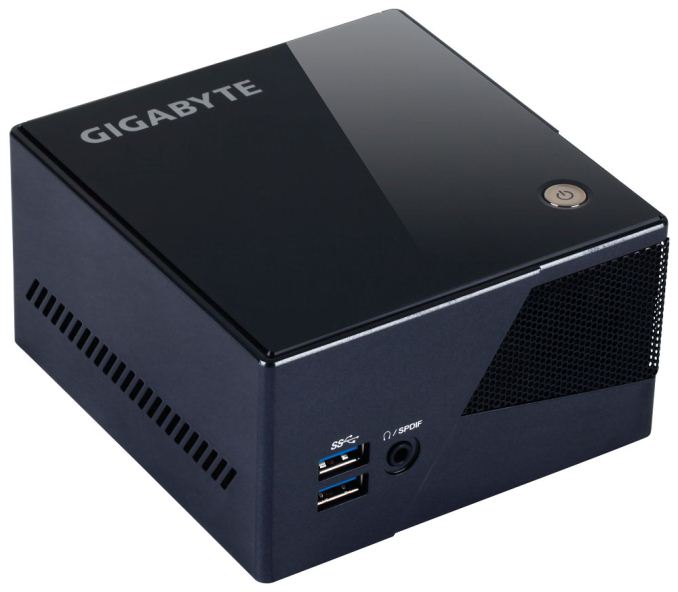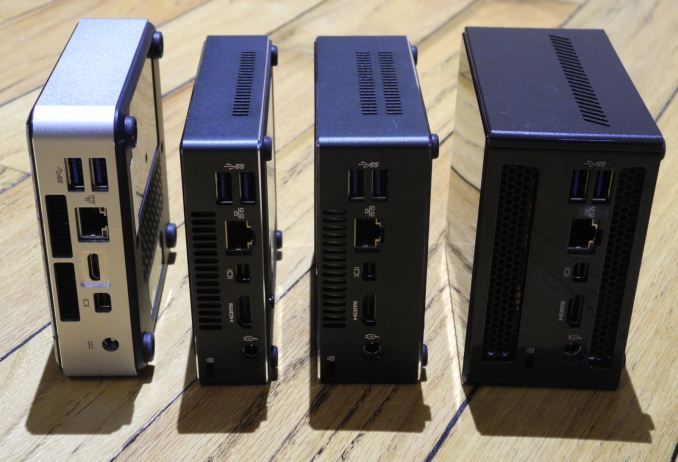GIGABYTE BRIX Pro: A First Look at the Intel i7-4770R with Iris Pro HD 5200
by Ganesh T S on January 7, 2014 8:00 PM EST
Introduction
Intel's high-end Crystal Well, the Core i7-4770R, has remained out of reach for consumers despite being introduced back in June 2013. While Apple's notebooks use the mobile Crystal Well parts, the 2013 iMac restricts itself to the Core i5-4570R. Users wanting to stay out of the Apple ecosystem have been left in the cold. Gigabyte is coming to the rescue with the launch of the BRIX Pro in the NUC form factor.
The BRIX Pro is a barebones desktop machine. We had looked at the various BRIX models before, and this model, while maintaining the length and width of the existing BRIX units, is equipped with the 65W TDP i7-4770R, and the unit comes in the NUC form factor! This means that the unit is really tiny. The length and width are almost the same as the other NUC form factor machines (as shown in the picture below). The BRIX Pro builds upon the BRIX s, which has support for a 2.5" drive. The height is still more than that of the BRIX s, in order to accommodate the thermal design for a 65W CPU.
Our review unit landed last Friday. With CES this week, and limited time at our disposal, we decided to split the coverage of the BRIX Pro into two parts. In today's article, we will look at the performance of the CPU and GPU, as well as the thermal performance of the package along with some power consumption numbers. In the second part towards the end of the month, we plan to go into more detailed benchmarks and how to outfit the BRIX Pro to get a well rounded system.
| Gigabyte's BRIX Pro Kits Comparison | ||||
| GB-BXi5-4570R | GB-BXi7-4770R | |||
| CPU | Intel Core i5-4570R | Intel Core i7-4770R | ||
| RAM | 2 x DDR3L SO-DIMM slots | 2 x DDR3L SO-DIMM slots | ||
| Display Outputs | 1x HDMI 1.4a, 1x mini-DP 1.2 | 1x HDMI 1.4a, 1x mini-DP 1.2 | ||
| USB | 4 x USB 3.0 | 4 x USB 3.0 | ||
| Gigabit Ethernet | Y | Y | ||
| mini PCIe (half-height) | 1 | 1 | ||
| mini PCIe (full-height, mSATA support) | 1 | 1 | ||
| Internal SATA | 1 (with power) | 1 (with power) | ||
| Power Supply | External 19V / 7.1A DC | External 19V / 7.1A DC | ||
| Suggested Pricing | $529 | $649 | ||
Since we wanted to get up and running quickly, the RAM and mSATA SSD were just transferred from the recently reviewed NUC kit to the BRIX Pro. In our second part of the review, we will evaluate the BRIX Pro with different SODIMMs / SSDs. For now, the benchmarks presented in the rest of this piece are based on the configuration below.
| Gigabyte GB-BXi7-4770R Build Components | ||
| Component | Price | |
| Chassis / CPU / Motherboard / PSU | GB-BXi7-4770R | $649 |
| Memory | Crucial CT51264BF160B 2x4 GB Kit | $96 |
| SSD | Intel mSATA SSD 530 | $183 |
|
|
||
| Total | $928 | |

















98 Comments
View All Comments
DIYEyal - Tuesday, January 7, 2014 - link
I could use something like that for editing on the go, much smaller than any mITX system.. Much cheaper than a laptop with similar specs.. I could plug it to the hotel's TV via HDMI and get some editing done (weird configuration, I know)CharonPDX - Tuesday, January 7, 2014 - link
Re: "One of the interesting aspects in the press release was the reference to 64 MB of eDRAM on the Iris Pro HD 5200.".Apple doesn't just "imply", they outright state it: "The 15‑inch MacBook Pro has a phenomenal display — with the graphics power to match. Its fourth-generation Intel Core i7 processor features Iris Pro Graphics with 128MB of embedded memory, which accelerates processor- and graphics-intensive tasks by acting as an ultrafast cache. "
But the Retina MacBook Pro uses the mobile chip, not the desktop chip. Maybe the desktop chip only has 64 MB?
JohnHardkiss - Tuesday, January 7, 2014 - link
Interesting. It would be gold if these seemingly contradictory bits of information would be settled.Daedalus1 - Tuesday, January 7, 2014 - link
I have been waiting for a NUC or similar to come out with the 5200 Iris Pro graphics for some time. At last. And then disappointment, it only supports 2 monitors not 3.Oh well maybe I just have to go the AsRock mini iTX route after all.
Daedalus
kgh00007 - Tuesday, January 7, 2014 - link
Great, I've been waiting for you guys to get a hold if one of these, I'm looking forward to part 2!I would also like to request a 1080p gaming benchmark, at low or medium details, this thing will likely be connected to a 1080p HDTV afterall, that's what interests me the most!
And maybe a look at the preformance difference between 8GB and 16GB RAM configurations if any!
ryrynz - Tuesday, January 7, 2014 - link
I think you could just look up any review of the difference between 8 and 16, there's not much.. which is why I haven't bothered moving to 16.DarkXale - Wednesday, January 8, 2014 - link
RAM benefits are binary.You either have too much, or too little. In the case of games its generally an easy answer; unless you're at 4GB, or rare cases 6GB, you have too much. Its still exceptionally rare for a game to be 64-bit, and they are thus incapable of addressing more than 4GB. The rest is simply up to the system & background tasks.
However, its always preferable to have too much RAM - than too little. Too much generally just means that you ended up paying a bit more - too little means extreme swapping, utterly annihilating performance.
8GB as such is the sweet spot, because its a level which is difficult to reach without the use of specific software - but cheap enough that going down to the 6GB or 4GB levels saves almost no money on a home-build setup.
lco45 - Monday, January 20, 2014 - link
Nicely put.8steve8 - Tuesday, January 7, 2014 - link
1. gigabytes own specs list 3200x2000 @ 60 Hz the max resolution on the displayport...why, it's DP 1.2? This would exclude it for use with all the new 4k LCD's coming our soon.
2. a few gaming benchmarks would be appreciated... part of the allure of this is that it's a tiny workstation that can also kind of play games.
Samus - Tuesday, January 7, 2014 - link
Wow this little thing is amazing.